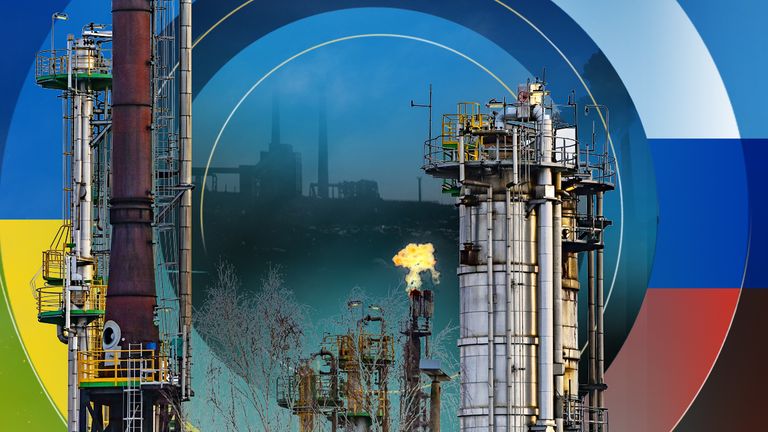Ukraine invasion: What does it mean for UK energy supply and global climate change action?
Wednesday 2 March 2022 19:20, UK
With a grave humanitarian crisis unfolding in Ukraine, some fear the war will distract from climate action. But there is hope it could accelerate it. Sky News explores some of the key factors.
What does the Russian invasion have to do with the climate crisis?
For decades the European Union has heavily relied on Russia's oil and gas, generating money and cash for Russia. But Russia is also reliant on revenues from fossil fuel sales, which make up around two fifths of government revenue.
Since Russia invaded Ukraine, British Petroleum (BP) ditched its 19.75% shareholding in Russian oil giant Rosneft. Several other fossil fuel companies including TotalEnergies, Shell, Equinor, ExxonMobil are also ceasing ventures with Russian majors.
Policy responses to Ukraine should address all the interlocking crises, says Bernice Lee from Chatham House.
While climate change is often deemed a "threat multiplier", it is clear from the last week "that fossil fuels are a threat multiplier too", she said. "We live in an unstable world. If rich counties fail to support vulnerable countries in tackling climate impacts and in their clean energy transition, it will only fuel a spiral of instability."
Will the Ukraine crisis affect UK energy supply and prices?
The UK gets just 5-6% of its gas imports from Russia, according to analysis of government data by think tank ECIU, so supplies are not likely to be so directly affected. Much of Britain's gas comes from the North Sea and Norway.
But because the UK operates in international gas markets, prices will be hit by any drop in global supply.
The conflict could push up British energy bills to £3,000 in October 2022, potentially a £600 increase from previously expected levels, according to ECIU.
Will the Russian invasion distract from climate action?
With war raging in Ukraine, many fear ministers will be distracted from climate action.
Germany has said it might need to use coal, the most polluting fossil fuel, for longer than expected, in order to free itself from gas.
However, in this case security and climate goals of European leaders in particular are aligned: replacing gas and fossil fuel use with clean energy, boosting independence from foreign imports.
How could the invasion of Ukraine accelerate climate action?
Many hope the crisis, given its intrinsic link with fossil fuels, will at least accelerate the green transition.
"Even if [a slight increase in coal] causes a short term boost in emissions, we'll also see a rapid ramping up of climate action: more renewables, more efficiency, fewer closures of nuclear plants than previously expected," Ms Lee adds.
She also predicts a rapid short term boost to energy efficiency efforts across Europe, which would reduce energy demand.
"Everything we can do on this by next winter is key. Every day counts.".
Read more:
Weapons, oligarchs and Putin's plan - Ukraine crisis explained
What's a no-fly zone and why won't the West enforce one in Ukraine?
In response to the current crisis, the EU is proposing expedite plans to link Ukrainian's electricity system to the EU's, which would boost Ukraine's independence from Russia's grid, with which it is currently tied.
The German government has brought forward its target for 100% renewable electricity by five years to 2035.
Leaders including Prime Minister Boris Johnson and Ursula von der Leyen have both called for an accelerated roll-out of clean energy.
"Renewables have a distinct security of supply advantage in that they don't require refuelling," explains environment expert Antony Froggatt.
But to maximise their use they need to be part of a flexible grid, involving measures such as storage, changing demand use and interconnectors, he says.
Giant undersea interconnector cables save UK 2 million tonnes of carbon emissions
A small group of around 18 Conservative MPs want the UK to increase its own fossil fuel supply by boosting North Sea fossil fuel production and lift the fracking moratorium.
The government's independent advisory Climate Change Committee recently warned that any new North Sea projects will take an average of 28 years to start producing oil and gas.
This is time the UK doesn't have if it is to meet its legally binding target to reach net zero emissions by 2050.
Will it disrupt climate diplomacy in forums like COP27?
Many experts say it is too soon to tell how Russia's invasion will affect its participation in climate diplomacy and international action, such as at the next yearly United Nations climate talks, COP27, in Egypt in November.
The COP talks are designed to give all countries an equal seat at the table, with anyone able to block progress, although these days few want to be perceived as great disruptors.
How will it affect global food supply and prices?
Ukraine is known as the "breadbasket of Europe," responsible for a large proportion of the world's wheat. Russia and Ukraine each account for 7% share of the world's cereals.
Egypt, China and Turkey import significant portions of these grains and are therefore particularly at risk.
We won't know for some time how badly Ukraine's landscape, nature and climate action will be impacted by the war.

